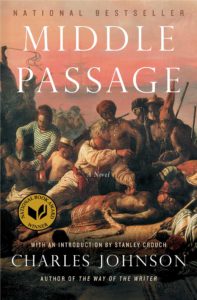 The title suggests a historical novel, for the Middle Passage was the sea route used by slavers going from West Africa to the Caribbean. The book does invoke important aspects of the slave trade, life at sea in the 1830’s, and the economics and politics of 19th century America, especially in the black community. There is a Melvillean aura of authenticity about it, especially an opening scene in a New Orleans tavern that could have been taken from Moby Dick.
The title suggests a historical novel, for the Middle Passage was the sea route used by slavers going from West Africa to the Caribbean. The book does invoke important aspects of the slave trade, life at sea in the 1830’s, and the economics and politics of 19th century America, especially in the black community. There is a Melvillean aura of authenticity about it, especially an opening scene in a New Orleans tavern that could have been taken from Moby Dick.
The story is framed as the transcript of the captain’s log of the Republic, a broken-down slave ship, but that device is thin. First-person narrator Rutherford Calhoun is a freed American slave from Illinois who re-wrote and completed the logbook in his own voice after the ship’s demise because like Ishmael, “I alone am escaped to tell thee.”
The horrors of life on a slave ship are rendered in gag-reflex detail. Cruelty, torture, dismemberment, death (of course), body fluids of every conceivable type but especially of the gastro-intestinal type, seeping wounds, loose teeth, exposed bones, flayed flesh, smashed heads, horrible disease, madness, rats, vermin, rotten food, and cannibalism. Notable by its absence was rape, to count small blessings. The shock value of such scenery diminishes over time although never to zero because Johnson is such a good writer. The epistolary format looks like a polite artifice to help sensitive readers distance themselves from the horrors described.
The descriptions of suffering seem excessive. Not to be overly reductive, but the point is made early on: life on a slave ship was awful for both captives and crew. Okay, got it. Why repeat that theme in a stuck loop? The repetition may illustrate the great wheel of life, from whose cycles of suffering one escapes only by enlightenment. Johnson’s other writings on Buddhist themes support that reading, as does Calhoun’s character arc.
I could have enjoyed a lot more explicit allegory like that. Buddhist, Hindu and Islamic allusions are faint, indeed. For a moment I wondered if the ship, Republic, represented politics and race relations in the U.S. republic during the years before the civil war, but that analogy is also very thin and wouldn’t support a term paper. I wanted it to be there. I wanted more depth than ‘just’ the story of a black man on a slave ship – rousing sea tale though it is.
I thoroughly enjoyed Johnson’s erudition and wit. The story is offered playfully, not literally, peppered with philosophical jokes and subtle anachronisms. Postmodern self-reference is a lot of fun. When stunned Calhoun is rescued from sea, near death, he complains that his mental acuity has devolved to appreciation of haecceity but not quiddity, and I had to laugh out loud. An ex-slave become thief become seaman makes an observation like that? But intellectual joking, along with plenty of plain silliness, kept my eyes moving through the scenes of profound suffering.
How can anyone make fun of the horrors of a slave ship? Johnson had to do it, because the horrors are really too awful to contemplate. You would throw the book aside with involuntary repugnance if its tone were as dark as its mood. The goofy, humorous tone makes the horrors tolerable in a way, yet by contrast, even more horrible. The result of that skillful blend is a magnificent artistic achievement.
After I closed the novel I felt it had been a cheesy fairy tale wrapped in a sketchy but gruesomely accurate report on American history, delivered as a self-aware writing exercise. I wished it had been more, but I liked it a lot for what it was.
Johnson, Charles. (1990). Middle Passage. New York: Simon & Schuster, 209 pp.
